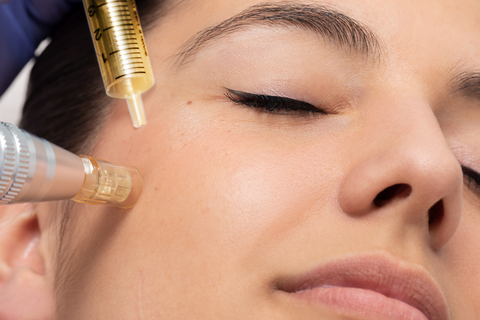Have you ever noticed how your skin seems to change with your hormones? From those frustrating breakouts in your teenage years to dry, dull skin during menopause, hormones play a huge role in how your skin looks and feels. At an aesthetics clinic in Melbourne, your cosmetic doctor can help you navigate these changes with tailored cosmetic skin treatments designed for your skin’s unique needs.
Hormones like oestrogen, progesterone, and testosterone can influence everything from oil production and skin thickness to pigmentation and collagen levels. During puberty, for instance, increased testosterone can lead to more oil production and acne. Pregnancy can bring a glow for some, but also pigmentation changes like melasma. As you reach menopause, oestrogen drops, and skin can become thinner and more prone to dryness and wrinkles.
When it comes to cosmetic skin treatments, understanding these hormonal shifts is key to choosing the right options. That’s why working with a qualified cosmetic doctor at an aesthetics clinic in Melbourne is so important. They’ll consider your age, skin type, lifestyle, and hormone influences to create a plan that supports your skin’s health and appearance.
How Hormones Affect the Skin
Let’s take a closer look at how hormonal changes can affect your skin at different life stages:
- Teenage years and early 20s: Increased androgen levels can stimulate oil production, often leading to acne and congestion.
- Pregnancy: Oestrogen levels soar, and many women experience skin that’s more sensitive or pigmented. Melasma, or ‘the mask of pregnancy’, is common during this time.
- Menopause: Falling oestrogen can mean drier, thinner skin that’s more prone to wrinkles and slower to heal.
Understanding this connection helps your cosmetic doctor tailor cosmetic skin treatments that are suited to your skin’s current condition, rather than a one-size-fits-all approach.
Cosmetic Skin Treatments and Hormonal Skin Changes
At an aesthetics clinic in Melbourne, your cosmetic doctor will assess your skin concerns and consider how hormones might be contributing. For example:
- Skin Smoothing Treatments: These can help reduce fine lines that become more prominent as oestrogen levels drop.
- Skin Volumising Treatments: Hormonal changes can lead to volume loss, and tailored treatments can help restore balance and a natural-looking result.
- Skin Brightening and Pigmentation Treatments: If hormonal fluctuations have caused pigmentation concerns, your cosmetic doctor can recommend treatments that focus on evening out and brightening skin tone.
It’s important to remember that these cosmetic skin treatments should always be performed by a qualified cosmetic doctor who understands the underlying causes of skin changes. This ensures the most natural and safe results, without compromising skin health.
Lifestyle and Skincare Adjustments
Alongside cosmetic skin treatments, lifestyle factors can support your skin health through hormonal ups and downs. Here’s what to keep in mind:
- Diet and hydration: A balanced diet with plenty of water, vitamins, and antioxidants can help keep skin healthy.
- Sun protection: Hormonal pigmentation (like melasma) can be worsened by sun exposure, so daily SPF is essential.
- Stress management: Stress hormones like cortisol can affect the skin, leading to inflammation and breakouts.
Recent Research and Insights
Australian and international research continues to highlight the link between hormones and skin health. An Australian consumer study conducted in 2023 focused on the skin-related effects of menopause. The research revealed that 51% of participants experienced dry, itchy skin, while over 34% reported wrinkles, sagging, and loss of volume. Notably, the study found that skin can lose up to 30% of its collagen in the first five years of menopause.
Interestingly, a 2025 review in Endocrine Reviews explored how hormones like oestrogen and newly discovered hormonal pathways help maintain skin integrity by influencing collagen breakdown, stem cell survival, and pigmentation, suggesting new avenues for hormone-based interventions to reduce skin aging.
These insights reinforce the importance of seeing a cosmetic doctor at an aesthetics clinic in Melbourne for professional advice that’s informed by the latest evidence. Your treatment plan will not only address the signs you see in the mirror but also work with your skin’s natural processes to keep it healthy long term.
Personalised Care for Hormonal Skin Changes
Hormonal changes are a normal part of life, but they don’t have to leave you feeling at odds with your skin. At an aesthetics clinic in Melbourne, your cosmetic doctor can help you understand the connection between hormones, skin health, and cosmetic skin treatments. Whether you’re dealing with breakouts, dryness, or pigmentation changes, there are tailored solutions to help you feel and look your best. The key is to work with a qualified professional who understands how hormones influence your skin, so you can choose the right treatments at the right time.


